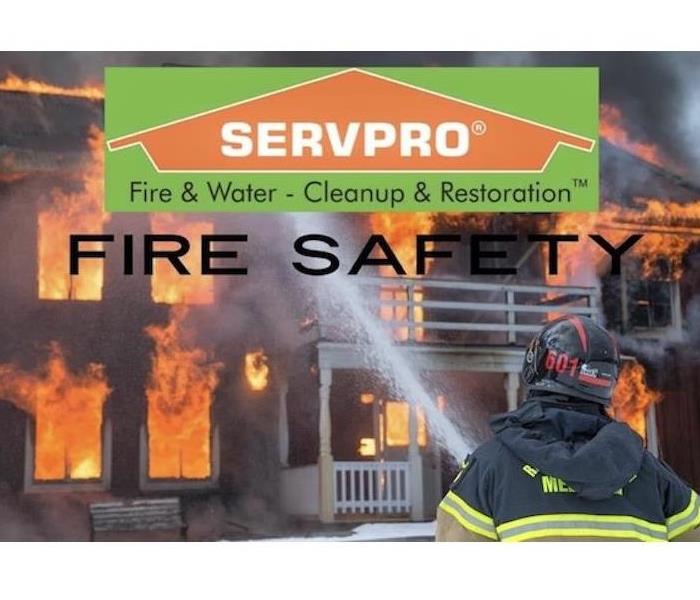Fire Safety Tips
8/6/2022 (Permalink)
Install Smoke Detectors and Carbon Monoxide Alarms
- Top of the list in preventing house fires is by installing smoke detectors and carbon monoxide alarms in your home and remembering to test them at least twice a year. The US Fire Administration recommends changing the batteries twice a year and replacing the detectors and alarms every 10 years.
Purchase Fire Extinguishers
- A fire extinguisher should be in every kitchen, because the kitchen is one of the most common place where house fires start. You should also have one on hand in your bedroom.
- Be sure they are easily accessible and most important, make sure everyone in your family knows how to use one. Each member of your family should be taught how to operate a fire extinguisher. For young children, post P.A.S.S. acronym near each fire extinguisher.
Inspect Heating Equipment, Annually
- National Fire Protection Association (NFPA) say the leading cause of fires in US homes are caused by heating equipment (including space heaters, fireplaces and heating systems)
- Have your furnace inspected and a tune-up done annually. It will prolong the life of your furnace and it can prevent house fires.
- It's important to know when heating systems aren't working properly, they can release carbon monoxide. Carbon Monoxide is a colorless, odorless gas that can cause severe illness and death.
- It is also recommended that you install a Notion Sensor next to your Carbon Monoxide alarm. This will notify you when your Carbon Monoxide alarm goes off, giving time for you and your family and pets to evacuate safely.
Don't use frayed or cracked electrical cords.
- Pulling on a cord can wear it out over time – and cords that are worn or frayed can increase the risk of a short circuit, an electrical shock, and even a fire.
Don't leave the kitchen unattended when the stove or oven is on.
According to the NFPA, cooking fires are one of the biggest causes of home fires and home injuries in the U.S.
Extension Cords should never be used on the following items
- Do NOT use an extension cord with the following items: ice makers, refrigerators, microwaves, space heater, hair dryer, garbage disposals, air conditioners, toasters/toaster ovens, washers/dryers, and coffee/tea makers.
Never leave lit candles unattended
- If you use candles regularly, it’s so important to put them out before leaving the room.
- You should also keep them far away from any blankets, carpets, or other flammable objects.
- If you have small children or pets, it’s also a good idea to keep lit candles out of reach.
Store flammable liquids properly
- According to the NFPA, flammable or combustible liquids cause more than 43,000 home fires each year!
- It's so important to carefully read product labels, keep an eye out for any warnings, and store accordingly.
Have your dryer inspected by a professional at least once a year
- Dryers cause more than 20,000 house fires every year, causing millions of dollars in damage.
- Regular cleaning and maintenance are all you need to protect your family and your home from dryer fires.
- Removing the lint trap from your dryer after every use and clean it.
- Lint will also build up inside the dryer vent and ductwork, so it's best to call a professional at least once a year to have an inspection and cleaning.
Consider renters insurance if you rent an apartment
- Renters insurance covers your personal property if it is damaged or stolen, medical and legal bills if you are found liable for damaging someone's property or injuring them, and temporary living expenses if your rental home is uninhabitable.





 24/7 Emergency Service
24/7 Emergency Service